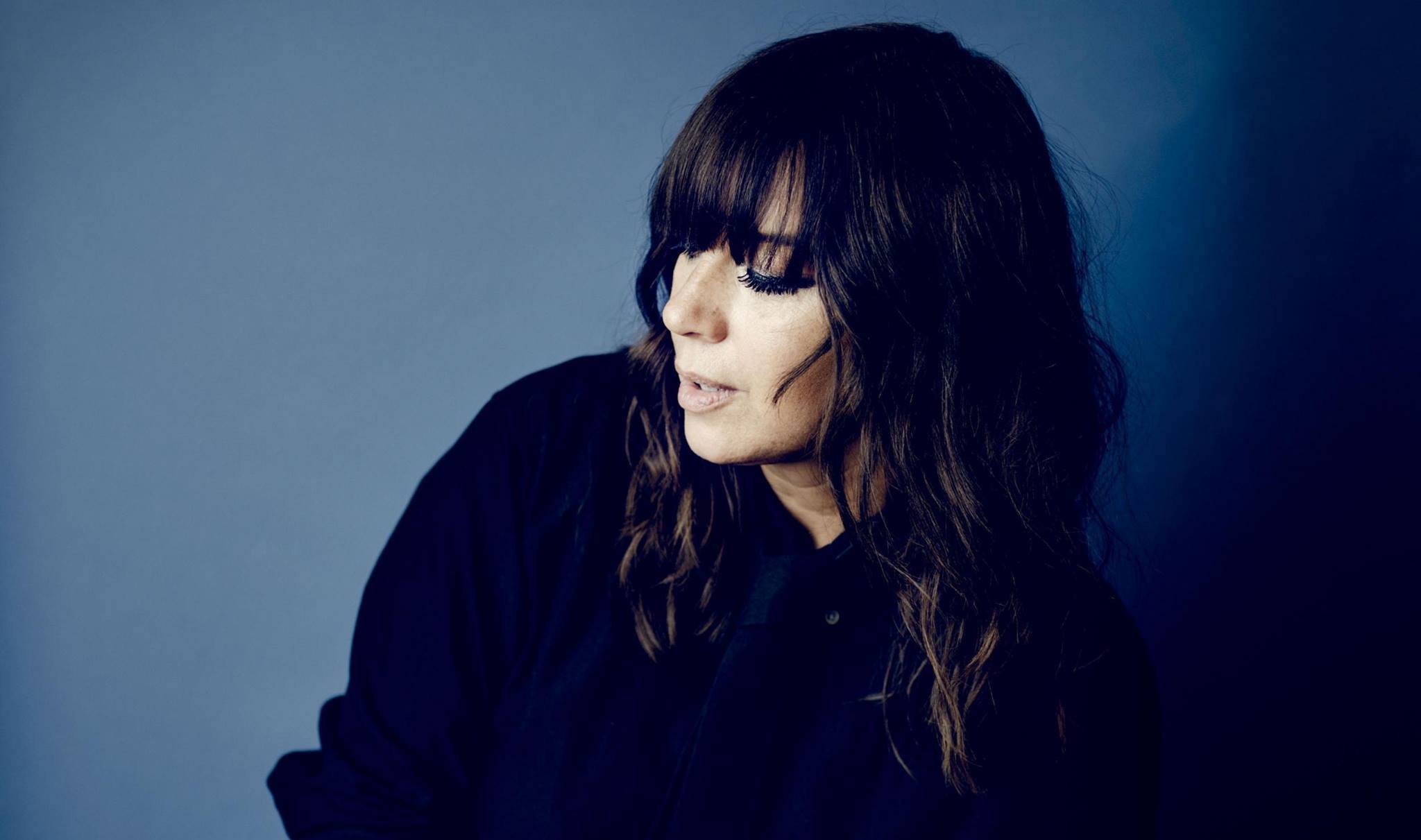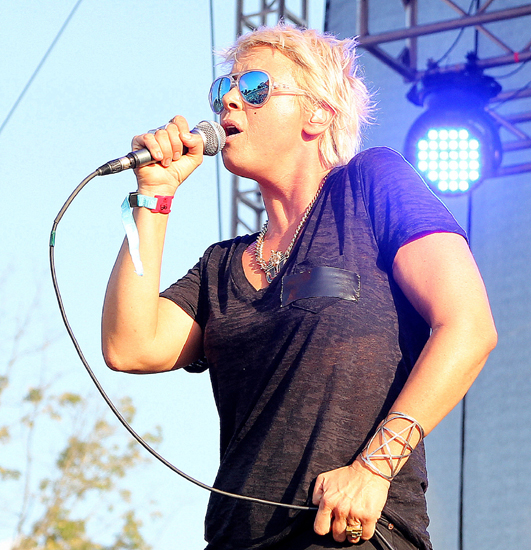Cat Power: It’s A Wonderful Life

photo by Julien Bourgeois
After years of health struggles and erratic performances, Cat Power has finally found her inner peace—and regained her true voice in the process.
Chan Marshall doesn’t want to talk about her health. But she does anyway and really, it’s a hard subject to shy away from. She hasn’t released an album since 2012’s Sun, which landed her on the Billboard Top 10 for the first time in her decades-long career. She got the news in the hospital—she was getting treated for hereditary angioedema, an autoimmune disease that causes swelling in the face and throat. Afterward she thought she was dying.
“I had tubes down my throat,” Marshall recalls on a late-summer Los Angeles morning from a chateau. “When my health collapsed, it was a different battle. It wasn’t personal. It was physical.”
But the years following this near-death experience were life-altering in many ways. She picked up her guitar and started playing solo—connecting with fans “mano a mano,” as she puts it. She tried starting a political organization with a friend of hers in Atlanta called Occuparty, and played a benefit concert in St. Louis to help with the legal funds for the protestors who were hitting the streets of Ferguson, Mo., in August 2014. She became pregnant shortly after and gave birth to her son in 2015.
So it isn’t surprising that Marshall named her latest Cat Power album Wanderer. She has been wandering for the last several years. But not all wanderers are lost, or directionless. Throughout the album’s 11 tracks, Marshall takes listeners into familiar Cat Power territory, moving from melancholy musings about a life gone awry to a deep dive into her world views. It’s 38 minutes of a woman who is not at a crossroads in her life, nor looking back at her 46 years on earth with regret or anger or sadness. It’s declarations of letting go, looking at things that may have caused strife, pain or fear, and saying, “Fuck you pain; fuck you fear. I’m out of here.”
This is quite something for Marshall. It’s a wake-up call, in a sense, fueled by her own sense of dying. It is also an example of what happens when maturity, in its fullest sense, has set in. Back in the early Cat Power days of the late-‘90s and early-‘00s, Marshall was infamous for her onstage meltdowns—crippling stage fright that seemed to cause panic attacks in real-time. Listening to Wanderer, and hearing Marshall speak with an air of confidence about her existence in the world, it’s easy to wonder how she got here. How did she find something we’re all searching for—day in and day out? Perhaps it’s her nomadic streak. Perhaps it’s connecting with a new life brought into this world—she says all the symptoms of her autoimmune disease dissolved after she gave birth. Perhaps it’s just music.
“There’s a real freedom that exists in the physical reality of singing songs to people and a transfer of energy that feels so healthy,” she says. “Because I thought I was dying for a couple years, I thought, ‘Well, I’m dying anyway.’ [Wanderer] finds me so much more grounded as a human, as a woman. Looking back on my life, traveling around, being alone for so much of it.” She trails off a bit, before stating, “Basically, this record is me processing all of it.”
Here’s an odd thing to know about Marshall: She doesn’t think her voice is a gift. But to anyone else, this doesn’t make sense—her voice is unlike any other. It’s a bit raspy and a bit deep, at times gentle and soft, only seconds later, brutally fragile. But if you tell her it’s a gift, then she’ll deflect that in a heartbeat.
“I don’t know notes. I don’t know chords. I could tell you what they are, but I couldn’t tell you what sound they make,” she says. “So it’s wherever my hands are, whatever the note is, whatever the tempo is—once it becomes something then my subconscious [takes over] and I choose to sing or not. Whatever words I make up right then are always the song. I was raised going to church with my grandma, and my dad was in a band. Seeing all these bands growing up [like] Charlie Daniels, the Allman Brothers—I don’t know how to describe it. I understood that a person sings when the music is on, and that’s what I understood. And that’s that. It takes a minute to understand. If there’s music, you sing along with it. I don’t think of it as a gift.”
Be that as it may, Marshall’s voice sounds as if it has been captured in a moment in time—that moment perhaps is 2006, when she released her breakout (and now classic) album The Greatest, a soulful collection of songs that she recorded with the Memphis Rhythm Band. That album’s production and scope were grand; Wanderer, in many ways, is a throwback to Marshall’s roots—just her and the piano or guitar, layered on top of sparse rhythms. Just one song, “Woman,” features backing vocals from Lana Del Rey, who Marshall has toured with during the last few years. Nico Segal, an associate of Chance the Rapper who has worked with Neil Young, contributed trumpet on the closing track, “Wanderer/ Exit.” Marshall is responsible for everything else, down to the production. Her vocals typically need one or two takes, and she’s done.
 Cat Power at Bonnaroo 2013 (photo by John Patrick Gatta)
Cat Power at Bonnaroo 2013 (photo by John Patrick Gatta)
“That’s always the plan,” she says. “When I’m recording or playing live, that is all the time there is. It’s obvious if my voice cracks or I say, ‘I fucked up that lyric.’ Obviously, I will do it again. But it’s the same thing as playing live for me. There’s something about once you do your job and then you go back and look at your job—like you sweep the fucking floor—it’s just the way I am. I don’t sweep it twice. I make sure the floor is swept once.”
Marshall started writing Wanderer after she got off the road supporting Sun, when she discovered that she was pregnant. She set up a home studio and quickly learned to love that way of working—recording through her pregnancy and after it—and analyzing whether each song was “honest enough” to put out into the world. When she had enough of those feelings, Wanderer was done.
That honesty shines through on songs like “Woman,” where she declares: “The doctor said I was better than ever/ Man you shoulda seen me/ The doctor said I was not my past/ He said I was finally free.” On the dark and bluesy “Black,” one of the album’s standout tunes, Marshall recalls someone’s horrific overdose in a bathtub, where Coca-Cola is poured down a victim’s throat and the angel of death appears from the shadows into clear view.
“When she brings it, she brings it,” says Rob Schnapf, who mixed Wanderer and has worked on seminal albums by Elliott Smith and Beck, as well as Booker T. Jones and Foo Fighters. “I think the performances are pretty directed and economic. Nothing extra. No fat.”
Another thing that’s happened since Sun came out: Marshall left her longtime label Matador, the indie institution she had been on since 1996, when she released her third album What Would the Community Think. In many ways, she was almost as synonymous with Matador as Pavement and Yo La Tengo. She was nearly done with Wanderer when she signed with Domino in early 2018, home to Animal Collective, Blood Orange, Dirty Projectors and Arctic Monkeys.
“When that dissipated, I found myself in the position I wasn’t expecting,” Marshall says. “But I’ll tell ya: Things are so good. Things are so much better. I still believe in forgiveness and all that jazz. I feel super thankful that [Domino] believed in me or some shit like that.”
All of these experiences informed her for the better, she argues. There were deaths in her life, friends going through terrible times and the processing of the world at large—tasks that everyone deals with at one point or another. But making it out—that’s not always an easy feat.
“I did Sun alone, and I was told I needed a hit record. I was told I needed top producers. I fought that so hard. To prove that I didn’t. [It was] major label pressure in this world where I’m supposed to have artistic freedom. But I did my job and it came out Top 10. But then the failure of the illness, the loss of several friends along the way for different reasons. My doctor helped me with tools to identify narcissistic people—people who eat off your kindness. I had to really cut away many people I thought were my allies for many years.”
These days, Marshall’s life is a pretty mellow one. She lives in Miami, raising her son, swimming, biking and dancing. She loves going to a monthly party her friend throws called “Miami Vice Episode,” where she’s constantly discovering new people, new ways of life, new dances. “All these songs that come out—they’re called riddims,” she says. “Every week, there’s five new riddims! There’s new dances every month. And it always goes away. It’s just amazing, the energy.” Look at the Miami Vice Episode Instagram account, and it’s easy to see how this could be a fantastic release. People are getting down—and on a Sunday night too.
So this is the new Cat Power, the one that’s living in a present tense that maybe wasn’t so planned this way—but it’s a change from where she was earlier this decade or even early in her career, where fragility and sobriety and her mental health seemed to define her. Marshall has come out on top, a final knockout punch for someone who sang, “Once I wanted to be the greatest.”
“Something I felt since I began doing this was that I wanted to come from a very singular, protected place—almost like I wanted these songs to feel like a totem,” she says. “Like grounding totems. I don’t know how to describe it. Just something to take pain away.”
Ask her how she’s doing. Don’t bring up her health. She doesn’t want to talk about it. That’s the past. This is now. And the future.
“It’s going great,” she says. “We’re still spinning on this earth. I think my situation is: I’m having a pretty blessed life. I’m thankful.”
This article originally appears in the October/November 2018 issue of Relix. For more features, interviews, album reviews and more, subscribe here.



















